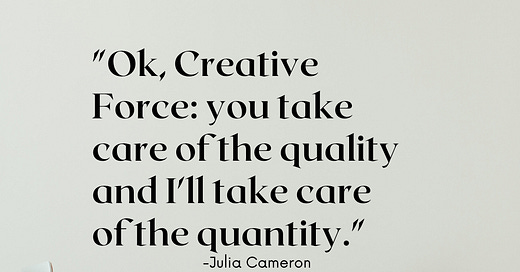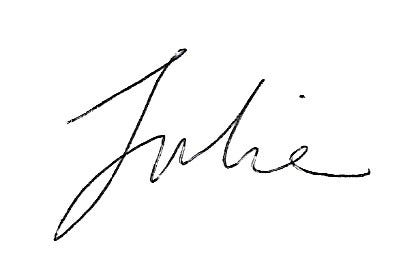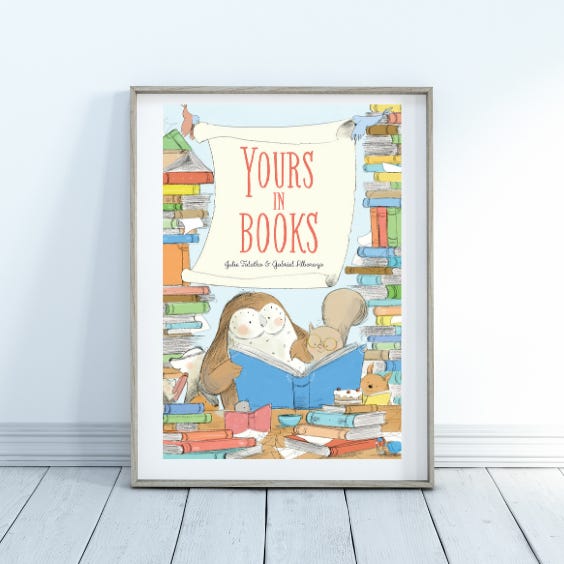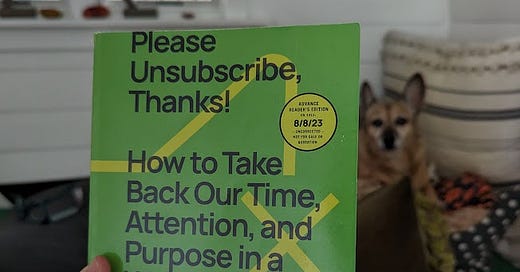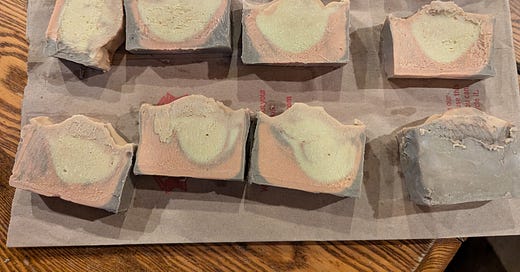
Discover more from Do the Work
Did you forget you're supposed to be having fun?
I finished The Artist's Way at the end of March. I've heard that it was life changing, and it may be too soon to tell, but I will say that, directly because of it, I finished a novel, got more focus and flow in my work day, and shifted my mindset about how I approach creativity. I've gotten a lot better about getting out of my own way.
The book has helped me a lot with identifying as an artist, a creative person, and a writer. I'm allowed to be weird, to be nonsensical, to be different. I've always been pretty good with this anyway, but I'm feeling stronger in my sense of having permission to be a weirdo if I want to. I loved the exercises of clarifying my dreams, imagining what I really wanted to achieve, and setting goals.
Here are my biggest takeaways from my 12 weeks of working through this book. I'm sure that if I do it again next January, I'll have completely different takeaways, but these are what stood out to me as what I needed to hear right now.
Have fun. My best writing comes when I'm having fun with it and not putting pressure on the writing to be something (a best seller, an award winner, this book might get bought by this editor, I wonder what color the cover will be). Prioritize the play and the fun. (Yes, it's still work, and yes, it's still a business and a career, but the best words -- for me anyway -- come when I'm having fun.)
Have faith that this is the right path. That this will work. Humans are meant to be creative. There's a notion in The Artist's Way of imagining the possibility that the plan God/The Universe/Whatever has in mind for you might just coincide with your big dream. Your job is to have the faith that they will coincide, and do the work.
Creative work is not all bright flashes of inspiration. Much of creative work is what happens in the dark. She uses two metaphors -- gardening and baking. The seed needs to germinate underground, the bread needs to bake in the dark hot oven. Your creative work needs the dark quiet space to grow into what it's meant to be, and you're not helping if you metaphorically rip it out of the dirt before it has had time to grow strong roots. For me this means multiple revisions, and time away from the manuscripts so that I can come to them with fresh eyes to see what they've become. It's always better to give myself the time to get the story right.
This is related to the last point, but it's important enough that it gets its own number: all creative work is productive. Even if it doesn't produce The Big Product, it's productive. It all builds, it all grows, it might be the dark underground work, although it's hard to see that that's what it is when you're doing it.
This one was probably the biggest for me. In Week 9, you write a note for yourself that says "Ok, Creative Force: you take care of the quality, and I'll take care of the quantity." I wrote this on a sticky note and put it on my computer monitor. This is a radical notion to me. If you're going to be a writer, then shouldn't you be in charge of the quality of your work? Well, yes. But also: you need to put in the time, to write and write and write, to get to that quality. Otherwise it might be someone else's notion of quality that I'm striving toward, mimicking, pretending to have. The way to get to my own, only-I-can-do-it work is to have fun, take the time, have faith, and take care of the quantity. Don't spend all your time trying to write the one precious manuscript that will save you, instead write heaps and heaps of manuscripts, and many great things will emerge.
Thoughts and Links
I've been obsessed with the Talking Heads lately. (Dave says "obsessed lately? or since 1980?") Maybe it's nostalgia, but it feels deeper -- something about their collaborative and also separate creation style is resonating for me, and I find myself craving stories of people creating art in a pre-internet age. This half-hour video of footage and interviews from 1979 was fun to watch. I'm inspired by David Byrne's wide-ranging projects, from music to film to radio and beyond. And I love this quote from Chris Frantz from that 1979 video: "We should take liberties whenever possible to contradict ourselves." Meaning: don't get stuck in one genre, don't feel like you have a very particular brand of art that you have to stay in. The Artist's Way is big on looking for synchronicities in life. One of my local bookstores, Nonesuch, is open for browsing, so I went in for the first time in a while, and just as I saw that there was a Maira-Kalman-illustrated book of David Byrne's American Utopia, "This Must be the Place (Naive Melody)" started playing in the store (except it was the Lumineers version) (not the Arcade Fire version). (I bought the book.)
I got my first COVID-19 vaccine shot! I was unprepared for how relieved I felt when I made the appointments. Have you scheduled yours yet?
I like this metaphor Cal Newport used on Deep Questions Podcast episode 11: that a parent trying to do deep work while actively parenting is like a firefighter complaining that they didn't get any work done on their novel while they were fighting a huge warehouse fire. You can get the work done by setting aside time, but you're probably not going to get real deep work done while you're also in charge of the fire (small children) (or whatever counts for distracting distractors in your life).
In that same episode, he said the way Ph.D. computer science candidates wrote groundbreaking papers was by reading as many complex and groundbreaking papers as they could. The same is true for writers of any type: the way to write groundbreaking and amazing books is by reading as many groundbreaking and amazing books as you can (and then, you know, writing a lot).
I keep exploring creative avenues outside of writing, with the idea that all creativity feeds each other. I love the embroidery how-to videos at Mixed Colors. She has opened her class videos for free; just sign up and you can see everything.
Two things Allyson Bird said in her interview on Cathy Heller's Don't Keep Your Day Job podcast blew my mind: "Mediocrity is a habit." You get stuck in a rut, you accept being mediocre. Stop it. And: "People feel very uncomfortable around women who don't hate themselves." Oof. I'll be holding that one in my heart from now on.
For the past year or so, I haven't been able to drink alcohol without feeling like garbage the next day. I would drink one drink, and would sleep horribly and spend half the next day with a huge headache. Maybe it's menopause? I decided to stop drinking. I need to prioritize my brain and my thinking. I picked up Quit Like a Woman by Holly Whitaker to think more about alcohol, our alcohol culture, and how alcohol is marketed to woman (you know -- all those "mommy's juice" memes and merch around wine). I'm still working my way through the book, but recommend it if you're interested in any of these things. (And I'm sleeping so much better. It's a little alarming how it probably took a full ten days to stop feeling headachey. I was drinking one drink, maybe one or two nights a week? Maybe it's how old I am now. Or maybe it's all the poisons. Who knows.)
Yours in Books will be published on August 24, 2021. Preorder now! If you preorder from Print: A Bookstore, you'll receive a book signed by me (pssst: if you want any of my books signed by me, you can order them from Print at any time). You can find other buy links, and more about the book, on my website.

